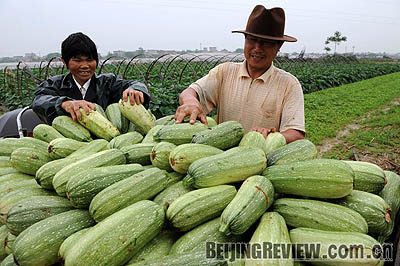|

Petrol Racketeers
China's oil industry regulators are to launch a nationwide crackdown on wholesalers who sell to illegal filling stations and dealers in the wake of supply shortages.
The State Administration for Industry and Commerce announced on April 21 that the seven-month campaign, starting from May, was aimed at improving oil quality sold on the market and preventing illegal hoarding and profiteering.
With high international oil prices, major Chinese cities, including Shanghai and Guangzhou, suffered fuel shortages last month.
Illegal dealers and filling stations are believed to have aggravated the situation by hoarding oil and jacking up prices to drivers wanting to avoid the long queues at licensed stations.
Refineries Subsidized
China Petroleum and Chemical Corp. (Sinopec) and PetroChina Co., the country's two leading oil refiners, will receive "appropriate" monthly subsidies for losses retroactive to April 1, the companies said in separate statements. Neither statement provided further details.
Chinese oil refiners have been running losses as world crude oil prices surge, but domestic refined product prices remain relatively low. Refiners in China can't pass on the additional raw material costs to consumers.
Also, the government will refund the value-added tax levied on some of PetroChina and Sinopec's imported oil products in the second quarter, said the Ministry of Commerce.
Coal Shortage
Reserves of coal for power generation have dropped to fewer than seven days in some Chinese provinces, Vice Chairman of the China Electricity Regulatory Commission Wang Yeping said recently.
Snowstorms earlier this year disrupted power supplies, prompting the country's power grid companies to lift spending on repairing and upgrading their transmission lines. Rocketing domestic demand for coal, fueled by such energy-intensive industries as iron and steel and chemical engineering, pushed up prices. The national crackdown on illegal coalmines as well as transportation bottlenecks also contributed to the rise.
Anti-piracy
Chinese authorities destroyed 47.18 million pornographic and illegal publications on April 20, the opening day of China's fifth "national intellectual property protection promotion week."
The campaign, carried out in 31 provinces, autonomous regions and municipalities, marked an unprecedented number of publications destroyed in a single day.
More than 17 provinces eliminated more than 1 million pieces each, with Guangdong topping the list, destroying 12 million, or a quarter of the total.
According to official statistics, China has in the past 20 years closed down 238 pirate disc production lines, solved more than 400,000 cases of IPR infringement and confiscated more than 1.3 billion illegal publications.
Car Prices Up
Domestically manufactured vehicle prices edged up 0.15 percent in March month on month, according to the latest figures from the price supervision center, which is under the National Development and Reform Commission, the top economic planner.
The price supervision report based on the country's 36 big and medium-sized cities showed that the prices of domestically made vehicles rose 1.05 percent in the first quarter compared with the end of last year, boosted by the price rise in steel products and energy.
The price of raw materials, fuel and power supplies increased 9.8 percent in the first three months of this year, 5.7 percentage points higher than the level for the same period last year, said the National Bureau of Statistics. | 